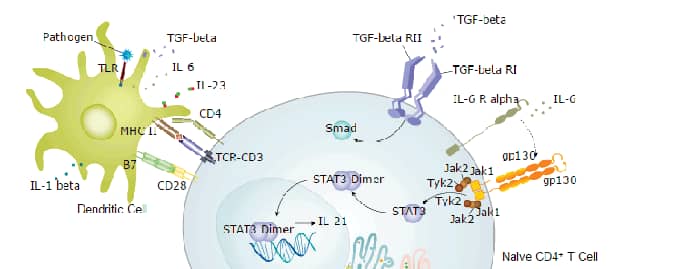Mouse CD4 Biotinylated Antibody Summary
Mouse CTL clone V4
Applications
Please Note: Optimal dilutions should be determined by each laboratory for each application. General Protocols are available in the Technical Information section on our website.
Scientific Data
 View Larger
View Larger
CD4 in Mouse Splenocytes. CD4 was detected in immersion fixed mouse splenocytes using Rat Anti-Mouse CD4 Biotinylated Monoclonal Antibody (Catalog # BAM554) at 25 µg/mL for 3 hours at room temperature. Cells were stained using the NorthernLights™ 557-conjugated Streptavidin (red; Catalog # NL999) and counterstained with DAPI(blue). Specific staining was localized to plasma membranes. View our protocol for Fluorescent ICC Staining of Non-adherent Cells.
Preparation and Storage
- 12 months from date of receipt, -20 to -70 °C as supplied.
- 1 month, 2 to 8 °C under sterile conditions after reconstitution.
- 6 months, -20 to -70 °C under sterile conditions after reconstitution.
Background: CD4
CD4 is a type I membrane glycoprotein belonging to the immunoglobulin superfamily. It is expressed predominantly on thymocytes and a subset of mature T lymphocytes. CD4 functions in collaboration with the T cell receptor in the recognition of peptide antigens that are presented by class II major histocompatibility complexes. CD4 also has been shown to be a coreceptor of HIV entry and specifically binds gp120, the external envelope glycoprotein of HIV.
- Dialynas, D.P. et al. (1983) J. Immunol. 131:2445.
- Dialynas, D.P. et al. (1983) Immunol. Rev. 74:29.
- Bendelac, A. (1995) Curr. Opin. Immunol. 7:367.
Product Datasheets
Citations for Mouse CD4 Biotinylated Antibody
R&D Systems personnel manually curate a database that contains references using R&D Systems products. The data collected includes not only links to publications in PubMed, but also provides information about sample types, species, and experimental conditions.
3
Citations: Showing 1 - 3
Filter your results:
Filter by:
-
CD4+ T cells are activated in regional lymph nodes and migrate to skin to initiate lymphedema
Authors: GD García Nor, CL Ly, DA Cuzzone, RP Kataru, GE Hespe, JS Torrisi, JJ Huang, JC Gardenier, IL Savetsky, MD Nitti, JZ Yu, S Rehal, BJ Mehrara
Nat Commun, 2018-05-17;9(1):1970.
-
T helper 2 differentiation is necessary for development of lymphedema
Authors: Catherine L. Ly, Gabriela D. García García Nores, Raghu P. Kataru, Babak J. Mehrara
Translational Research
-
Impaired salivary gland function in NOD mice: association with changes in cytokine profile but not with histopathologic changes in the salivary gland.
Authors: Jonsson MV, Delaleu N, Brokstad KA, Berggreen E, Skarstein K
Arthritis Rheum., 2006-07-01;54(7):2300-5.
Species: Mouse
Sample Types: Whole Tissue
Applications: IHC-Fr
FAQs
No product specific FAQs exist for this product, however you may
View all Antibody FAQsReviews for Mouse CD4 Biotinylated Antibody
There are currently no reviews for this product. Be the first to review Mouse CD4 Biotinylated Antibody and earn rewards!
Have you used Mouse CD4 Biotinylated Antibody?
Submit a review and receive an Amazon gift card.
$25/€18/£15/$25CAN/¥75 Yuan/¥2500 Yen for a review with an image
$10/€7/£6/$10 CAD/¥70 Yuan/¥1110 Yen for a review without an image






